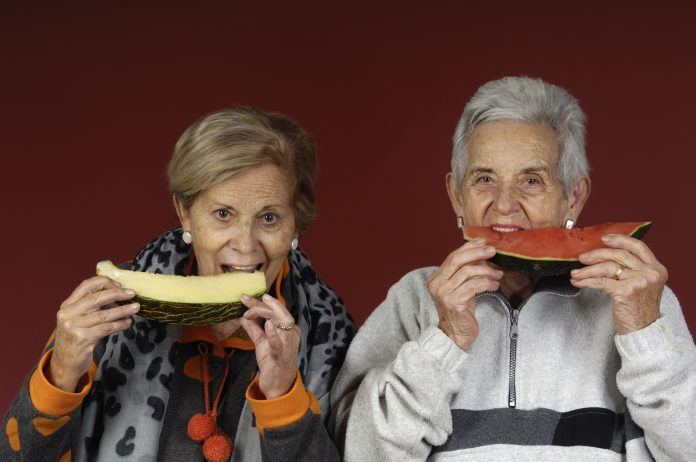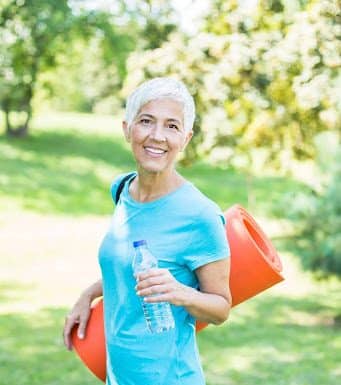The vast majority of seniors live with at least one chronic health condition and many live with more than five. I don’t think we can ever learn too much about senior health. Your health and well being as you age depends mainly upon three factors: nutrition, your physical health and your emotional health.
Let’s talk about these 3 top senior health facts!
Nutrition
Eating healthy food makes a huge difference in not only managing health conditions but ensuring that they don’t develop. Many are preventable or at least manageable. Seniors should make a priority of becoming actively involved in their health and well being as well as making choices that will benefit their overall health.
Good nutrition results in:
- More energy and a stronger immune system
- Greater longevity, usually because good food choices result in protection against illness
- Reduced risk of high blood pressure and high cholesterol
- Less risk of diabetes
- Improved cardiovascular health
- Younger, healthier looking skin and better weight control
- Improved digestion through consumption of fruits and vegetable, whole grains and water
The effects of poor nutrition can build up over time and can lead to a weakened immune system. This can leave seniors vulnerable to pneumonia and other serious infections, and increase the risk of death. Seniors requirements for certain nutrients differ from those who are younger.
Protein:
Protein helps seniors maintain body tissue, the immune system and muscle mass. Economical protein sources are legumes, eggs, peanut butter and low-fat dairy products.
Calcium and Vitamin D:
Most seniors don’t consume enough calcium and Vitamin D. On top of that, certain medications and physiological changes interfere with their absorption and retention. So, the recommended intake of these two nutrients is higher for seniors.
Calcium strengthens teeth and bones as well as decreases the risk of kidney stones and may control blood pressure. Seniors who have difficulty tolerating dairy products can drink reduced-lactose milk, take lactase enzyme tablets and eat yogurt with live, active cultures.
Vitamin B6:
B6 plays an important role in immune system function and assists with the metabolism of food and formation of red blood cells. It can be adversely affected by some medications.
The consequences of low B6 include increases in coronary artery disease and stroke. B6 is provided by bananas, whole-wheat bread, chicken, eggs, oatmeal, peanut butter, pork, potatoes, brown rice, tuna, shellfish and walnuts. Vitamin B12 also is another vitamin lacking in seniors’ diets and can be found in fortified cereals, lean meat and some fish and seafood.
Another key to optimal senior health is water. Besides drinking water, there are foods with higher water content such as melons, grapes, cucumbers, onions, apples, cabbage and soup.
Physical Health
Everyone has different ways of enjoying themselves and the activities you enjoy will change as you age. Seniors find they may have less energy than they once did, either due to chronic conditions, medications they are taking or just wear and tear on their bodies.
Senior Health includes staying in good physical condition
Many seniors start with walking. It’s easy and it’s a great way to get from one place to another as well as spend time with others. Depending on any physical challenges you may face, don’t fall for the myth that growing older automatically means you’re not going to feel good anymore. It is true that aging means physical changes, but it doesn’t have to mean discomfort and disability.
The are often local opportunities to go swimming and do low impact exercises at community centres and gyms. Check out what is around you. Might be closer then you think.
Many of these efforts to physical activity also provide an opportunity to go out with others and be quite social. So another great benefit to senior health, socializing.
While seniors can’t avoid illness or pain anymore than those who are younger, many of the physical challenges associated with aging can be overcome or improved by exercising. It’s never too late to start! No matter how old you are or how unhealthy you’ve been in the past, caring for your body has benefits that will help you stay active, manage health problems and increase your energy. In fact, seniors who take up exercise often show greater physical and mental improvements than those much younger!
Emotional Health is very important
As we age, as at any time, there will be times of happiness and times of stress, though they may be caused by different factors. It’s important to find healthy ways to cope with challenges. This ability will help you make the most of the good times and keep your perspective when times are tough.
What are you grateful for? Increasing age quite often includes increasing loss. Enjoy each day as much as possible and spend time with those you care about, doing things that you love to do.
Don’t forget to express your feelings. Many of us have a hard time showing emotions. Find healthy ways to process your feelings, perhaps by talking with a close friend or writing in a journal.
Accept what you can’t change. Many things in life are beyond our control. Learn to laugh at yourself and stop taking everything so seriously. Enjoy the ironic things in life. Look for the good in everything, even the ridiculous.
Start looking at your health today!
Seniors who take control of their own health enjoy the benefits of looking better and feeling better, both physically and emotionally. They report that they feel better than ever because they are making more of an effort to be healthy.
This article is intended for informational purposes only. Please consult your health practitioner for more information and before taking vitamins, supplements or starting new exercise.

























